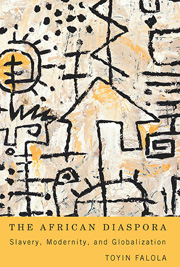Book contents
- Frontmatter
- Dedication
- Contents
- Preface and Acknowledgments
- Introduction: The Old and New African Diaspora
- Part 1 The Old Diaspora: Slavery and Identity Politics
- 1 Africa and Slavery in a Transnational Context
- 2 The Slave Mutiny of 1839: The Colonization of Memory and Spaces
- 3 The Centralization of Africa and the Intellectualization of Blackness
- 4 Communalism, Africanism, and Pan-Africanism
- Part 2 An African Case Study: Yoruba Ethnicity in the Diaspora
- Part 3 The New Diaspora: Transnationalism and Globalization
- Postscript: United States Foreign Policy on Africa in the Twenty-First Century
- Notes
- Bibliography
- Index
3 - The Centralization of Africa and the Intellectualization of Blackness
from Part 1 - The Old Diaspora: Slavery and Identity Politics
Published online by Cambridge University Press: 05 September 2013
- Frontmatter
- Dedication
- Contents
- Preface and Acknowledgments
- Introduction: The Old and New African Diaspora
- Part 1 The Old Diaspora: Slavery and Identity Politics
- 1 Africa and Slavery in a Transnational Context
- 2 The Slave Mutiny of 1839: The Colonization of Memory and Spaces
- 3 The Centralization of Africa and the Intellectualization of Blackness
- 4 Communalism, Africanism, and Pan-Africanism
- Part 2 An African Case Study: Yoruba Ethnicity in the Diaspora
- Part 3 The New Diaspora: Transnationalism and Globalization
- Postscript: United States Foreign Policy on Africa in the Twenty-First Century
- Notes
- Bibliography
- Index
Summary
Without question, the production of knowledge on race, slavery, colonization, and all forms of Western domination has been one of the most critical links between Africans and African Americans, and between Africa and most of the Western world. Of course, the movement of people from and to Africa provided the foundation for this mutual intellectual engagement and dialogue. The forced movement produced by slavery created the origins of African American identity. Voluntary migrations followed, with substantial increases since the 1980s, creating today a large number of black people in the United States whose ancestors have no connections whatsoever with American slavery. For over two hundred years, African Americans have been going to Africa as part of a mission of permanent settlements, semipermanent habitations, temporary visits, and heritage trips. The concept of “black” as a race and as a social, cultural, and political group has emerged concomitantly. African and African American scholars and the academy have recognized the concept of a black community as distinctive and have thus organized courses around and conducted research on it.
This chapter is about how knowledge has been generated around the black community. I will be dealing with how knowledge is constituted around the black experience (epistemology), how this knowledge is gathered and presented (methodology), and how it is put to use (activism). Aspects of this knowledge constitute a political manifesto: the use of knowledge to ensure the survival of the race, its emancipation from all forms of domination, and the generation of a proud future.
- Type
- Chapter
- Information
- The African DiasporaSlavery, Modernity, and Globalization, pp. 72 - 90Publisher: Boydell & BrewerPrint publication year: 2013



